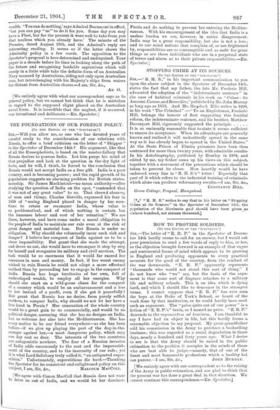STOPPING CRIME AT ITS SOURCES.
[TO TUE EDITOR OF THE "SPECTATOR:1 Sin,—" R. H. S.," in his important communication to you upon the above subject in the Spectator of December 14th, states the fact that my father, the late Mr. Frederic Hill, advocated the adoption of the "indeterminate sentence" in the case of habitual criminals in his work on " Crime : its Amount, Causes, and Remedies," published by Mr. John Murray as long ago as 1853. And Mr. Hailelock Ellis writes in IVO, in his work "The Criminal" :—" To an Englishman, Frederic Hill, belongs the honour of first suggesting this fruitful reform, the indeterminate sentence, and his brother, Matthew
Davenport Hill, vigorously supported the principle It is so eminently reasonable that to state it seems sufficient to ensure its acceptance. When its advantages are generally known and realised it will undoubtedly spread in the same way as it has already begun to spread in the United States." At the State Prison of Elmira prisoners have been thus sentenced for more than twenty years, with admirable results. In his Autobiography, published by Bentley in 1894, and edited by me, my father sums up his views on this subject, together with a statement of the precautions which should be taken to prevent its abuse. How heartily would he have endorsed every line in " R. H. S.'s " letter ! Especially that part of it which refers to the industrial training of criminals, which alone can produce reformatory results.—I am, Sir, &a., Grove Cottage, Frognal, Hampstead.
CONSTANCE HILL.
[**1 "R. H. S." writes to say that in his letter on "Stopping Crime at its Sources" in the Spectator of December 14th, the population of the Moulmein gaol should have been given „ as sixteen hundred, not sixteen thousand.]










































 Previous page
Previous page